Budyeri kamaru (hello!) from Eora Country,
I hope this message finds you in good health and high spirits as we embark on another exciting quarter at Media Diversity Australia. As we continue our mission to advocate for a truly inclusive and representative media landscape, it is with great pride that I share with you the latest developments within our organisation.
We have recently been reminded of the pressing need for our work in combating racism and fostering a safe environment for diverse journalists. The “grotesque racist abuse” described by veteran Indigenous journalist (and our founding Advisory Board member) Stan Grant that escalated after her spoke on ABC about the impact of colonialism on Aboriginal and Torres Strait Islander people ahead of King Charles III’s coronation has underscored the urgency of our efforts. It also validates the importance of our latest research report, the Online Safety Of Diverse Journalists, which sheds light on the challenges reporters from marginalised communities face and provides recommendations for change.
In honour of Stan’s resilience and to address the specific challenges faced by journalists of colour, MDA held closed Listening Circles in Sydney and Melbourne, providing a safe space for Indigenous and culturally and racially marginalised attendees to share newsroom experiences and discuss potential solutions. These inspiring events brought together journalists on the frontlines of our struggle for media diversity. I also spoke publicly with several outlets about our critical work, with MDA’s Founder and Chair, Isabel Lo, penning a heartfelt piece.
Moreover, we are thrilled to celebrate the historic appointment of Massilia Aili, an emerging reporter and proud Australian Muslim woman in hijab, to Channel 9 News. Massilia’s on-air role is a testament to our progress in challenging stereotypes and breaking down barriers in the media industry. Her presence will undoubtedly contribute to a more accurate and authentic representation of diverse voices within our newsrooms.
Congratulations to the journalists and media professionals from First Nations and multicultural communities, including Marina Go AM and Narelda Jacobs OAM, recognised in this month’s King’s Birthday honours.
As our Women of Colour Mentorships and Winter Fellowship wrap up their successful runs this month, I’m delighted to announce our new Media Pathways Program in collaboration with Western Sydney University (WSU). As a former refugee and WSU graduate, this program is particularly close to my heart! The initiative, supported by Bennelong Foundation and Multicultural NSW, aims to provide aspiring journalists from underrepresented backgrounds, particularly refugees and asylum seekers, with the skills and networking opportunities necessary to navigate the industry. Stay tuned for the September session information and sign-up details.
I want to thank our dedicated team and supporters as we forge ahead. Through your unwavering commitment and belief in our cause, we continue to drive change and make a lasting impact. Please consider supporting Media Diversity Australia here.
Please stay connected, engaged in our programs and initiatives, and together, help us work towards a media industry that truly reflects the rich tapestry of our society.
Happy reading,
— Mariam Veiszadeh (CEO) and the Media Diversity Team
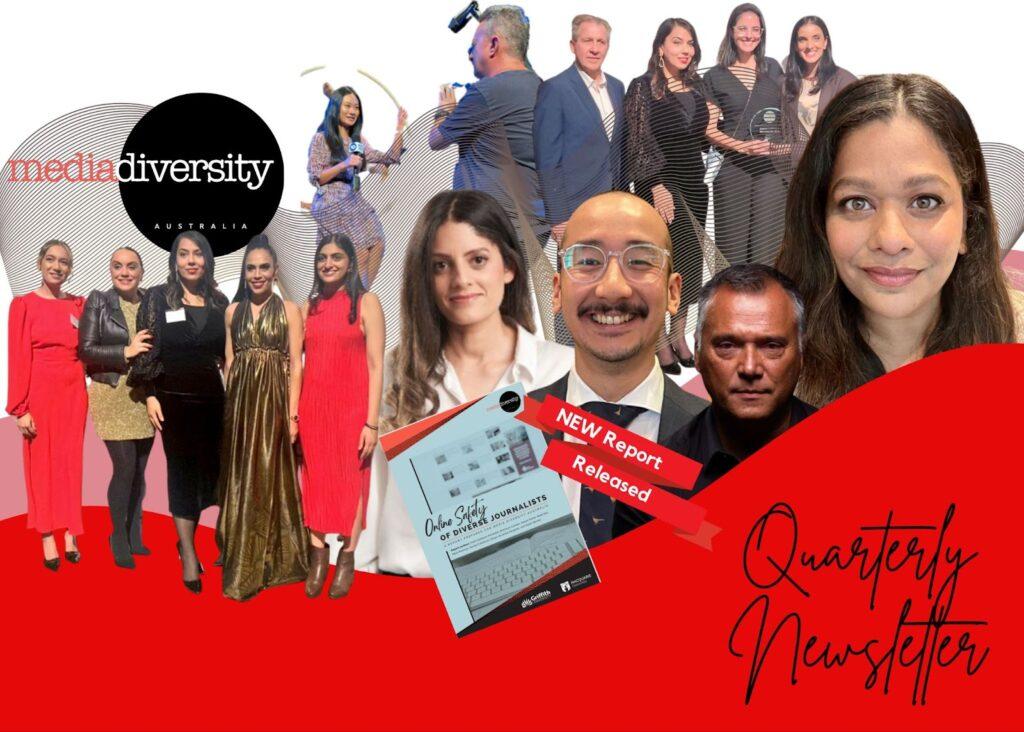
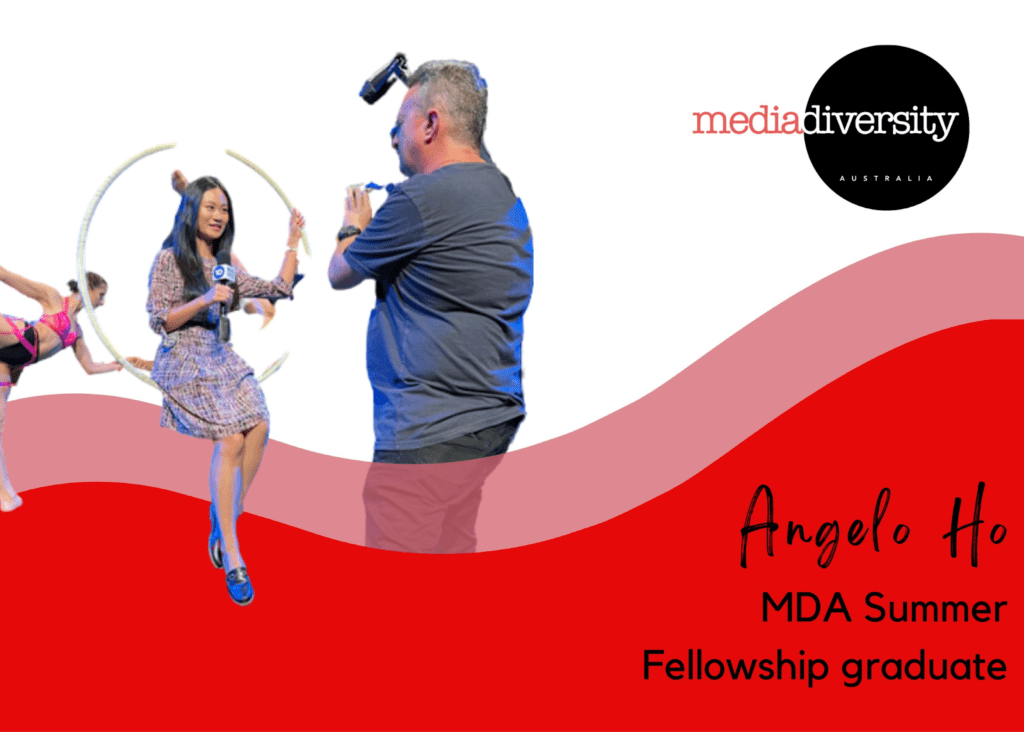
“
”
In 2022, Angela Ho completed her Summer Fellowship with 10 News First Perth. An aspiring multi-platform storyteller, Angela is exploring connection and influence through undergraduate studies at Curtin University in journalism and law, a digital reporting role at ABC Perth and acting as Client Relations Manager for WAUC, a management consulting charity empowering top university students to provide high-quality services for non-profits like MDA.
“The Fellowship gave me a great way to benchmark my progress and newsroom readiness. As a student especially, it was an ideal way to test my assumptions sooner rather than later about what the industry, job, and newsroom culture looked like, enabling me to think more meaningfully about how I would want to approach a career in the media.”
“I’ve had a lot more exposure to the journalism space throughout my degree, so the next year will be about scoping out what the landscape looks like in law through public and commercial sector clerkships. That being said, I’m so grateful to be doing that exploration while working and learning from the talented team in Perth’s ABC newsroom.
Pre-MDA, journalism was an intellectual passion I loved learning about but wasn’t sure I could thrive in. Post-MDA, I’ve grown my media confidence and appreciate there is room for cultivating CaLD potential and success – if we can overcome the mental barrier of always justifying our merit in the newsroom. Hopefully, I’ll have a clearer picture for you in a year!”
“Half the game is mental. If you can conquer limiting beliefs and self-perceptions about who is entitled to tell Australian stories, you’ve won half the battle. I was lucky to have a network of diverse, aspiring journalists through my MDA cohort and mentor Simone, so if you can, reach out to and lean on your networks. You’ll be surprised how buoying this support can be.
Once you’re on the ground, take the time to observe the processes and workflows so you know the cadence of your newsroom. Don’t be afraid to ask for help or feedback. Try to get to know your colleagues: reporters, camos, and chiefs of staff alike.
Probably worth keeping in mind is that I’m still working on all of the above things, too! Trying not to take myself too seriously keeps me grounded when the going gets rough. The first few steps can be awkward, and bumps and stumbles are part of the process.”
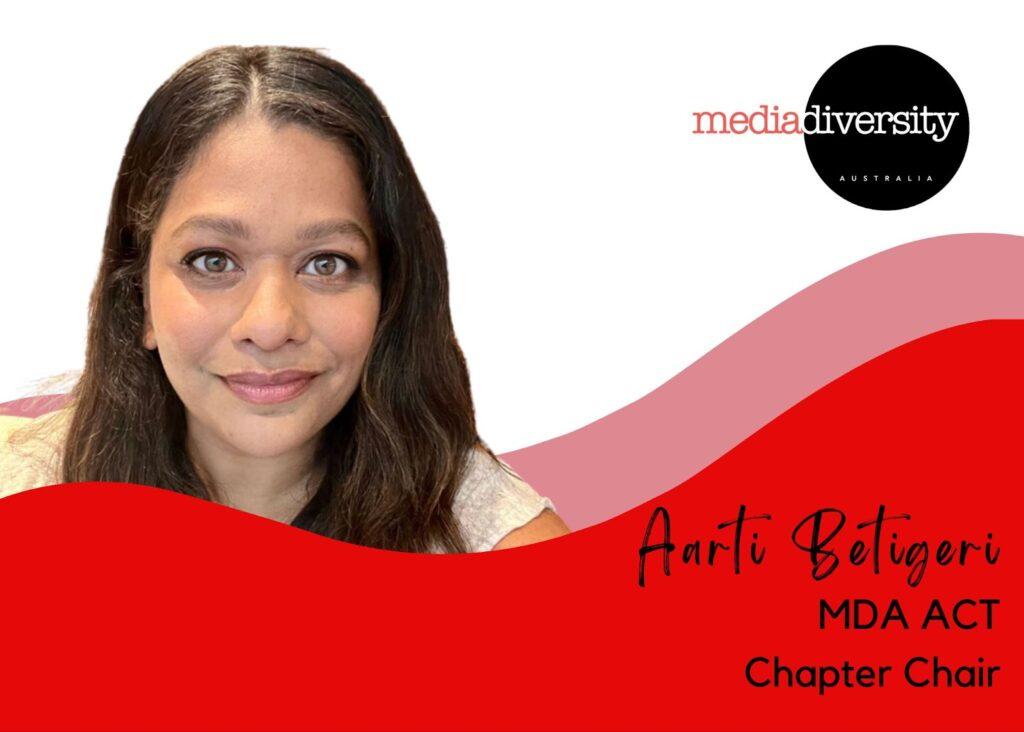
Aarti Betigeri is a multi-platform journalist and former foreign correspondent based in Canberra who brings lengthy experience to her role as Chair of Media Diversity Australia’s ACT Chapter. She works as a media advisor for the Australian Council for International Development and reports for numerous outlets, including The Lowy Institute and Monocle.
“I’ve been so lucky to have had the opportunity to do many different things in my career. I’m working as a media advisor in the international relations space right now, which is great and something I’ve worked towards for a long time. I do miss the creativity, though, and I’d love to balance the rational, left-brain-focused work I do now with something more creative. I’d love to do more podcasting.”
“I always thought the things I’ve faced in my career were about me, and it dawned on me, after people started opening up and telling their stories, that it’s structural, that Australian media has been slow to understand the need for diversity. Every time we share our story, the walls break down slightly. I’m equally encouraged and discouraged by the way media approaches diversity. But, like in many spaces, there’s a difference between what people say and what they do. It’s a two-steps forwards, one-step back thing.”
“Some of the media industry’s building blocks contribute to the general sense of bias many people feel when working there. I’d love to see MDA, perhaps in collaboration with the union and other organisations, work on advocating for structural changes that will help create a healthier media industry in general – which would no doubt help strengthen the case for more diversity. In particular, we need a change around defamation laws; proper resourcing for independent media (I think there should be more government and philanthropic funding for it); ongoing training opportunities for workers; more support for freelancers; etc. At a local level, while it’s a good idea to help create pathways for up-and-coming diverse journalists and media workers, creating solid networks amongst current journalists from diverse backgrounds, and allies that cut across organisations and existing hierarchies, should be a focus.”
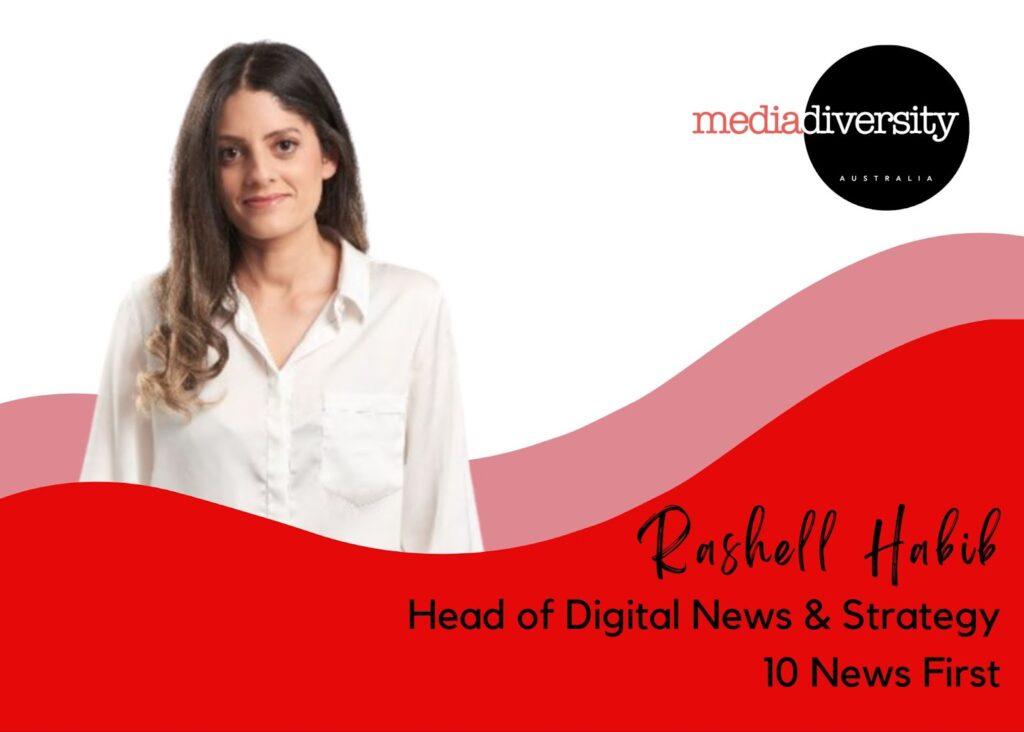
Rashell Habib is the Head of Digital News & Strategy for 10 News First under the Paramount Global brand and the latest member of the Walkley Awards Judging Board. She started her career at News Corp, working as an opinion writer for the Daily Telegraph, a News Local journalist, and news.com.au social media manager, before an editor stint at Netflix AUNZ, then joining Channel 10.
“Witnessing the general inclusivity and meeting with many diverse leaders was impressive and notable. Not only was the on-air talent a representation of the communities that watch them, but those that worked behind the scenes reflected the same diversity and inclusivity. Much like us here in Australian, there is an understanding that audiences that make up our viewership come from a plethora of backgrounds and content and talent need to represent that.”
“It’s more about looking at the potential of people and helping them achieve that. Sometimes it’s as simple as a bit of self-confidence, while other times, it’s a matter of workshopping ideas; there’s no great light bulb moment. It’s consistent communication, inclusion in decision making and respect for a point of view that differs from your own.”
“Media diversity has improved a lot since I started in journalism, since MDA started, and even now. But as the Stan Grant situation showed, there’s always work to be done. Two steps forward, one step back.”
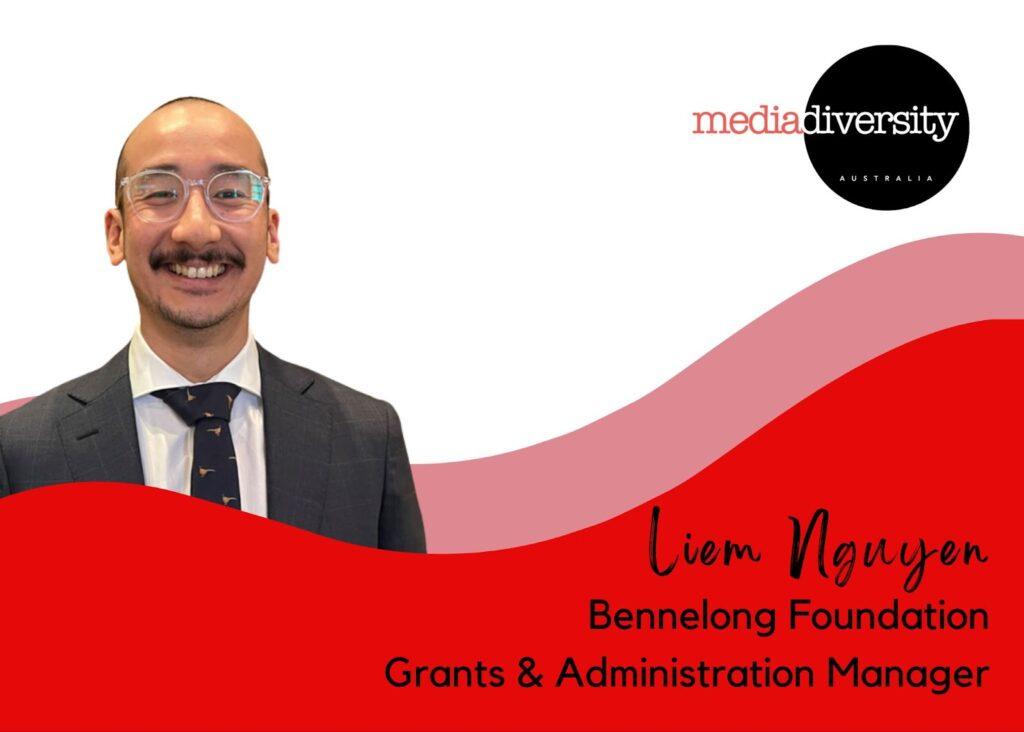
Bennelong Foundation’s Grants & Administration Manager, Liem Nguyen has worked in technology and business roles in start-ups, corporates and not-for-profits for over a decade. Passionate about sharing stories of social and cultural identity, Liem and the Bennelong team are supporting MDA’s inaugural Media Pathways Program.
“Providing opportunities for positive and lasting change in our community. Our granting focus areas are in Education, Training & Employment, Community Health and Wellbeing and Cultural Inclusion projects for First Nations people, Australian in migrant and refugee communities and those encountering socioeconomic disadvantage. We are also active participants in the philanthropic space and collaborate deeply with out peers to build partnerships, networks and capabilities within the sector.”
“What we liked about the [Media Pathways] project submitted by Media Diversity Australia was that it supported young migrant and refugee cohorts and people from culturally and linguistically diverse backgrounds with workshops to build awareness and skills in the media industry and guaranteed internship placements. We believe meaningful work is life-changing for people as it allows them to control their lives.”
“We believe representation is important. “You can’t be what you can’t see,” we often hear from our grant partners and communities. Media Diversity Australia helps build the talent pipeline and scaffolding for young media students and professionals to flourish in their careers. Representation in media also allows for increased empathy in telling stories that affect our multicultural communities.”
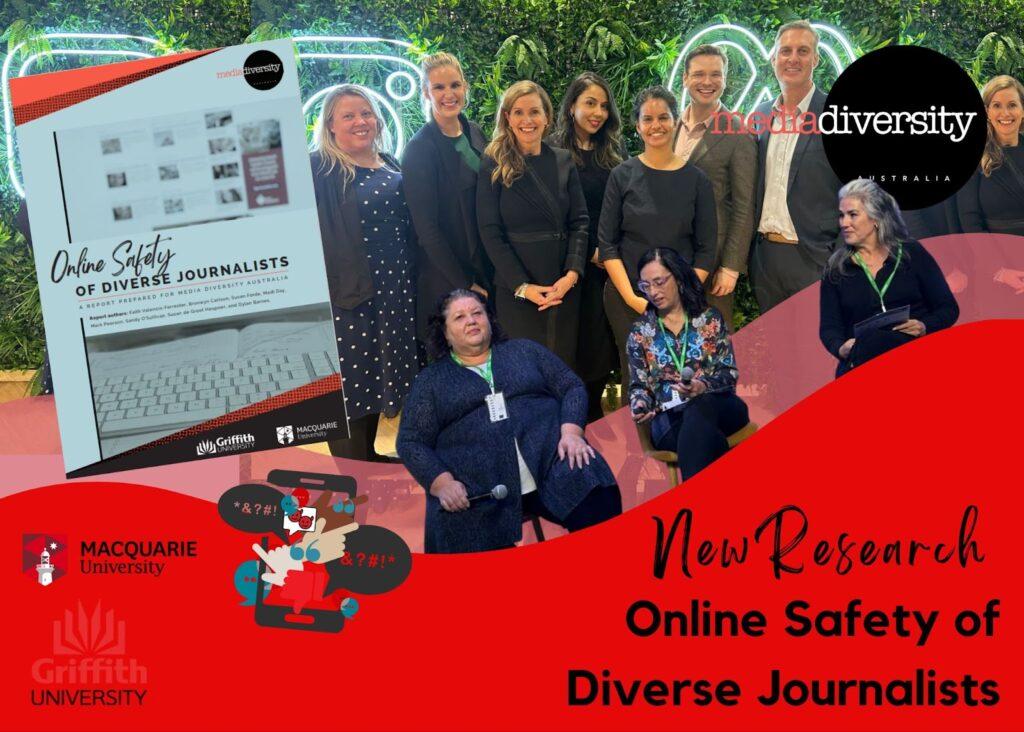
On World Press Freedom Day (May 3), we launched the Online Safety Of Diverse Journalists report, our Australian-first research which served as a critical step towards identifying, understanding, and addressing online abuse and harassment of diverse journalists and media workers. Check out the infographic, press release and official report here.
It wasn’t an easy task for MDA’s CEO and a small group of judges to choose the winner of the Media Diversity Australia award (supported by NEMBC) at this month’s 2023 Walkleys Mid-Year Celebration. The category, which honours journalists making an outstanding contributions by reporting or covering diverse people or issues in Australia, was won by ABC reporters Hagar Cohen and Raveen Hunjan for their ‘Racism allegations lead to staff exodus’ investigation.
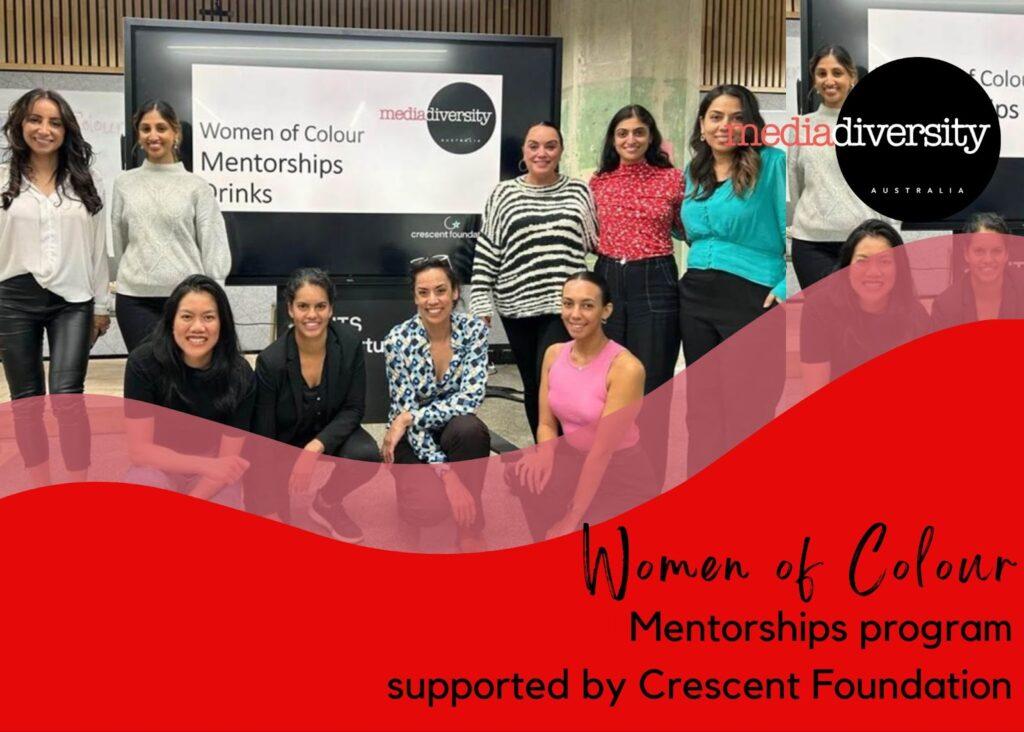
From left to right: Antoinette Lattouf (WOC Mentor and MDA Co-Founder), Alicia Vrajlal (WOC Mentee), Angelique Lu (WOC Mentee), Uma Patel (WOC Mentor), Paula Kruger (WOC Mentor), Madison Howarth (WOC Mentee), Simone Amelia Jordan (MDA Director of Special Projects), Anushri Sood (WOC Mentee), Mariam Veiszadeh (MDA CEO). Image credit: Supplied.
Several Sydney-based participants from our Women of Colour Mentorships gathered at UTS Startups to celebrate the culmination of the inaugural 12-month program, which Crescent Foundation, Monash University and the University of Melbourne supported. Shout out to those who weren’t in attendance: Nehal Dalgliesh, Bernadine Lim, Mibenge Nsenduluka, Ruth Brook, Shuba Krishnan, Pranjali Sehgal, Cathy Wilcox, Famida Rahman, Tanya Denning-Orman, Rhanna Collins, Rashida Yosufzai, Tania Lee and Junko Howe.
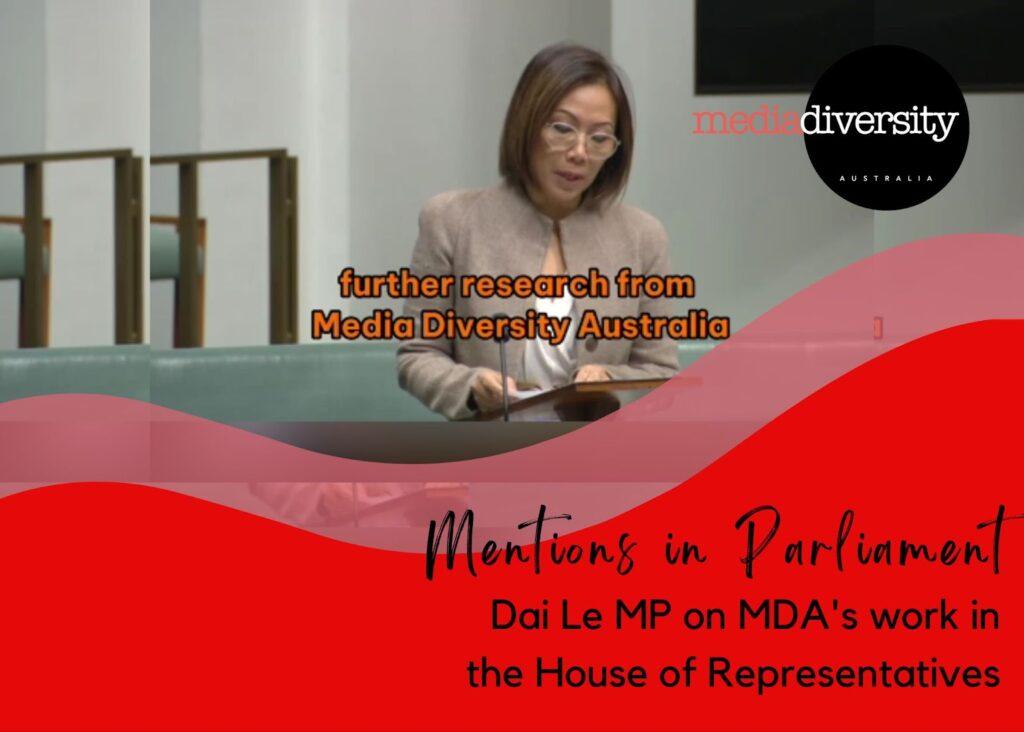
Our ground-breaking Who Gets to Tell Australian Stories research was mentioned in the House of Representatives this week by the Independent Federal Member for Fowler, Dai Le MP. Our impact is far-reaching; check out Le’s heartfelt speech here.
As a not-for-profit organisation, we rely on the help of our incredible volunteers. With your financial and volunteer support, we can continue to run programs to support culturally and linguistically diverse journalists, conduct agenda-setting research, run networking events, provide practical solutions for the media industry, and much more. If you would like to make a tax-deductible donation to support the vital work we do, please click here.
Founded by journalists (Isabel Lo and Antoinette Lattouf) in 2017, Media Diversity Australia (MDA) is a national not-for-profit organisation, working towards creating a media landscape that looks and sounds like Australia. We have expertise in delivering evidence-based research, bespoke programs, strategic memberships and partnerships that disrupt the status quo and pave pathways for diverse representation across Australian media.